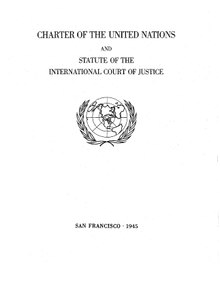United Nations Charter
| United Nations Charter | |
|---|---|
| Short title: | UN Charter, UN Charter (not official) |
| Title (engl.): | Charter of the United Nations |
| Abbreviation: | UN-Ch. (not official) |
| Date: | June 26, 1945 |
| Come into effect: | October 24, 1945 |
| Reference: |
BGBl. 1973 II p. 430, 431 6 languages, Statute of the International Court of Justice p. 505; Amendment to Art. 61: BGBl. 1974 II p. 769 , 770 Amendment to Art. 40: BGBl. 1980 II p. 1252 |
| Contract type: | Multinational |
| Legal matter: | international law |
| Signing: | June 26, 1945 |
| Ratification : | October 24, 1945
|
| Consolidated full text of the Charter | |
| Please note the note on the applicable contract version . | |
The Charter of the United Nations (from charter , pronunciation [ ˈkarta… ]), in Austria statute of the United Nations , is the founding treaty and thus the " constitution " of the United Nations (UN). It also contains the Statute of the International Court of Justice as an integral part. It was signed on June 26, 1945 by 50 of the 51 founding members in San Francisco . Because the formation of a government in Poland has not yet been completed, a space has been left in the document for this country. The associated signature was given on October 15, 1945, making Poland the 51st founding member. The charter entered into force on October 24, 1945, after being represented by the then five permanent members of the Security Council ( France , Soviet Union (since 1991 the Russian Federation ), China (from 1945 to 1971 represented by the Republic of China , since 1971 represented by the People's Republic of China ), United Kingdom , United States of America ) and the majority of the other signatories had been ratified.
The charter as an international treaty binds all members based on the corresponding provisions of international law. Changes to the charter require a two-thirds majority of the members of the General Assembly, including the approval of all five UN veto powers .
In the Federal Republic of Germany, the law on the accession of the Federal Republic of Germany to the Charter of the United Nations was signed on June 6, 1973 by Federal President Gustav Heinemann . Both German states joined on September 18, 1973.
The charter was largely inspired by Immanuel Kant's book On Eternal Peace .
Content of the UN Charter
- preamble
- Chapter I : Aims and principles (Art. 1, 2), general prohibition of violence
- Chapter II : Membership (Art. 3–6)
- Chapter III : Organs (Art. 7, 8)
- Chapter IV : The General Assembly (Art. 9-22)
- Chapter V : The Security Council (Articles 23-32)
- Chapter VI : The peaceful settlement of disputes (Articles 33-38)
- Chapter VII : Measures in the event of a threat to or breach of the peace and in the event of acts of aggression (Art. 39-51)
- Chapter VIII : Regional Agreements (Articles 52-54)
- Chapter IX : International cooperation in the economic and social field (Articles 55-60)
- Chapter X : The Economic and Social Council (Articles 61-72)
- Chapter XI : Declaration on territories without self-government (Art. 73, 74)
- Chapter XII : The international fiduciary system (Articles 75-85)
- Chapter XIII : The Trustee Council (Art. 86-91)
- Chapter XIV : The International Court of Justice (Articles 92-96)
- Chapter XV : The Secretariat (Art. 97-101)
- Chapter XVI : Miscellaneous (Articles 102-105)
- Chapter XVII : Transitional provisions relating to security (Art. 106, 107)
- Chapter XVIII : Amendments (Art. 108, 109)
- Chapter XIX : Ratification and Signature (Art. 110, 111)
See also
literature
- German Society for the United Nations (ed.): Charter of the United Nations and Statute of the International Court of Justice. DGVN, Berlin 2016, pp. 5-66 ( PDF ).
- Reinhard Pohanka (ed.): Documents of freedom. Marixverlag, Wiesbaden 2009, ISBN 978-3-86539-950-2 , pp. 163-169.
- Nico J. Schrijver: The Future of the Charter of the United Nations. In: Max Planck Yearbook of United Nations Law. Volume 10, 2006, pp. 1–34 ( PDF , English).
- Bruno Simma et al. (Ed.): The Charter of the United Nations - A Commentary. 2 volumes. 2nd Edition. CH Beck, Munich 2002, ISBN 3-406-49900-7 (English).
Web links
- Charter of the United Nations . In: UN.org (original English version)
- United Nations Charter . In: UNRIC .org
- United Nations Charter . In: Humanrights.ch
- United Nations Charter . In: Menschenrechtsabkommen.de
Individual evidence
- ^ The development of membership in the United Nations, 1945 to 2011. In: bpb.de. October 1, 2017, accessed March 18, 2019 .
- ^ The founding of the United Nations. In: DGNV.de. Retrieved March 18, 2019 .
- ↑ Germany in the United Nations. In: bpb.de. February 2, 2011, accessed March 18, 2019 .
- ↑ Konstantin Pollok : The United Nations in the Light of Immanuel Kant's work On Eternal Peace ( Memento of October 23, 2017 in the Internet Archive ) , Sic et Non 1996; Lothar Brock : Why do we need the United Nations today? Balance sheet and perspectives of the world organization ( Federal Agency for Civic Education ) (accessed on October 22, 2017).
